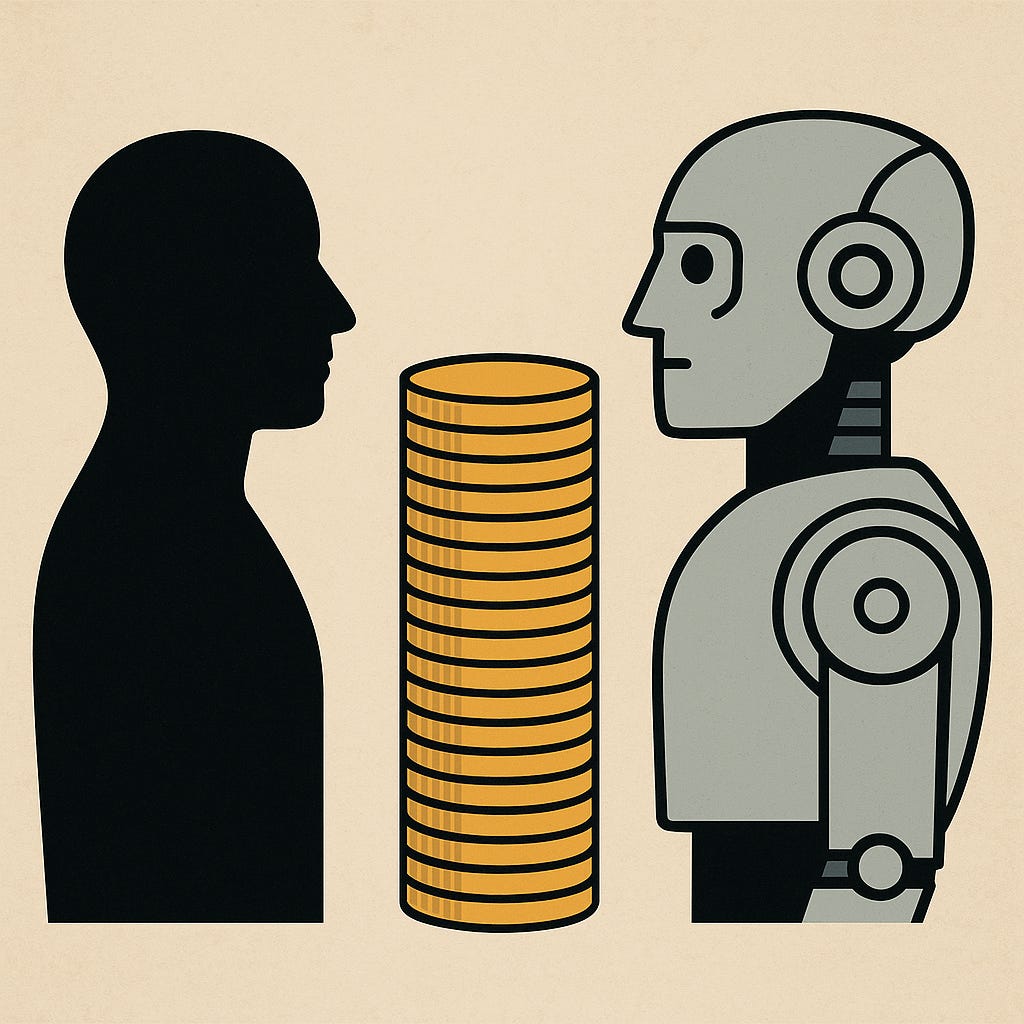In a recent interview with the Yale Review, New Yorker essayist John Cassidy remarked:
“But this all points to the way that people have given up on the idea that you can just leave everything to the market, and that, as I said, the big basic questions about capitalism, about economic systems generally, are coming back again.”
Cassidy’s words are meant to signal a shift in public mood—a recognition that the market, left to itself, cannot solve all our problems. And yet, even this framing quietly assumes that the answers to these “big basic questions” will be found within the economic system—by tinkering with incentives, redesigning policies, or restructuring institutions.
But what we have been leaving to the market is only a sliver of who we are and what we are about. The market is just a tiny part of our lives, but it does not seem like that. And that, I believe, is the real problem.
The Market’s Distorting Mirror
The market, as it exists, is not simply a neutral tool for allocating resources. Over time, it has come to act like a distorting mirror, reflecting back to us a reduced image of ourselves: not as complex, meaning-making beings, but as consumers, producers, and investors.
We breathe its logic without noticing. We measure worth in price, success in growth rates, time in billable hours, and even relationships in transactional terms. This is why reform efforts—whether more regulation, better redistribution, or technological fixes—often fail to feel transformative. They keep us inside the mirror’s frame.
The Robot Thought Experiment
I sometimes ask audiences: How much money would I need to pay you to turn you into a robot?
Most people laugh, hesitate, then name a horribly large amount—say, a billion dollars each—as if to say, “Sure, I’d give up my humanity, but only for an unthinkably high price.”
Let’s take this absurd exercise seriously for a moment. If there are about 7 billion people in the world, and each demands one billion dollars to become a robot, the total “value” of our collective humanity would be: 7 billion million dollars—7,000 times more than the size of the world economy, which is roughly 100 trillion dollars.
This isn’t an economic calculation in the conventional sense. It’s a reminder that the true worth of our lives—our loves, dreams, capacities, and dignity—vastly exceeds the sum total of the things we can price, trade, or consume.
The Trap of Affordable Desires
And yet, modern capitalism trains us to think of ourselves as nothing more than bundles of affordable desires. We unconsciously accept the premise that what cannot be priced does not belong in the realm of serious public concern.
The result is a cultural narrowing. Friendship becomes instrumental. Education becomes credentialing. Nature becomes a “resource.” Citizenship becomes consumer choice. Even self-worth gets pegged to earning potential.
If this is the anthropology we accept—this compressed definition of what it means to be human—then no economic fix will be enough. We will keep solving for the wrong problem.
Redefining Ourselves Before Reforming Systems
This is why the solution to the structural problems of our economic system may not lie within the economic system at all. The deeper work is to redefine ourselves in a way that resists the market’s monopoly over meaning.
That means asking, not “What kind of economy can we afford?” but “What kind of humans do we want to be?” And then building an economy that serves that vision.
The order matters. Economics is downstream from philosophy, sociology, and anthropology. If our sense of self is already reduced to consumer and producer identities, the most well-intentioned reforms will be pulled back into that narrow frame. But if we begin from a richer understanding of what it means to live well, we can design economic structures that support—not define—that life.
Beyond Measurement
Economists already know that GDP is not a measure of well-being, that not everything that counts can be counted, and that markets fail in predictable ways. But in practice, our public imagination is still tethered to economic metrics.
If the “value” of our humanity is indeed thousands of times greater than the world’s economic output, then any market-based measure will always understate what matters most: the work of care, the bonds of community, the cultivation of beauty, the joy of discovery, the dignity of being.
These are not inefficiencies to be eliminated. They are the point of the whole enterprise.
Restoring the Bigger Frame
Cassidy is right that the big questions about capitalism are coming back. But the biggest question of all may be: Do we have the courage to look beyond the economic system itself for answers?
The market can be a useful servant, but it makes a poor master. It cannot tell us who we are. And unless we reclaim the right to answer that question for ourselves—without outsourcing it to prices, profits, and growth rates—our reforms will remain cosmetic.
We are more, much more, than the sum total of our affordable desires. The work ahead is not just to repair the market’s mechanisms, but to recover the fullness of our humanity, and then to let that fuller vision guide what we build next.
[….TO BE CONTINUED]
********
Disclaimer: The opinions and thoughts expressed here reflect only my personal views and not of the institution where I work.
Nothing I have written here is set in stone. I am putting these ideas to start a conversation and bring people to discuss and debate the issues captured here. Give me feedback, and it will help me learn.


